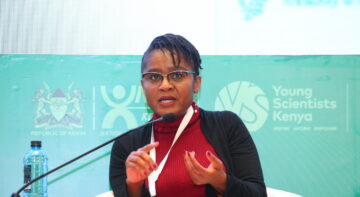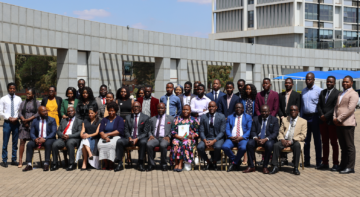News

Members of the Kenya Parliament, specifically women, have expressed the need to close the evidence gap currently curtailing effective legislation and policy formulation.
Speaking at a workshop organised by AFIDEP and the Parliamentary Caucus on Evidence-Informed Decision-Making (PC-EIDM), the Members of Parliament (MPs) acknowledged the critical role evidence plays towards enhancing their effectiveness in legislation, representation and policy-making. “In today’s world, we require strong evidence for decision-making,” said Hon Susan Musyoka, Member of Parliament Machakos County and Chairperson of the PC-EIDM.
She went on to observe that the Caucus is aware of the need for evidence to play its critical role in policy debate in the Kenya Parliament. The objective is to ensure that more MPs recognise the need to access and use the latest evidence in order to formulate laws and policies that address the real challenges facing their constituents.
The workshop, which specifically targeted members of the Kenya Women Parliamentary Association (KEWOPA), provided an excellent opportunity for the women Parliamentarians to speak out on the challenges they are grappling with as legislators. Hon Naisula Lesuuda, a nominated Senator, Samburu County and the Deputy Chairperson of KEWOPA in the Senate, said that through the Association, women in Parliament play a critical role since KEWOPA’s mandate is to ensure that policies are gender-responsive, and that programmes related to women’s affairs get adequate resource allocation. Evidence is therefore of essence as the Association needs to ensure that its recommendations are evidence-informed.
MPs need to be evidence-champions
The discussions were further enriched by input from the Evaluation Society of Kenya represented by Jennifer Mutua, who spoke on the opportunities for evidence use in legislation in Kenya. “Evidence has the potential to make a difference in our country,” she noted. Further, she emphasised that evidence has a role to play in Parliament, specifically to support legislation and resource allocation. She therefore called upon the MPs to be evidence champions in order to ensure that Kenya remains on the path towards the socio-economic success it aspires to achieve as set out in Vision 2030.
Good and bad evidence
In his address to the MPs, AFIDEP’s Executive Director Dr Eliya Zulu explained to the members the distinction between good and bad evidence. “Different kinds of research can give different kinds of evidence based on the nature of the sample population and the methodology,” he said. He also pointed to the fact that evidence can either be good or bad, depending on how it is generated. In addition, he said that is critical that evidence is appraised to ensure that it is of good quality before it is used in decision-making.
Rapid evidence response can go a long way
The MPs expressed their desire to use evidence to debate policy issues but the evidence is not readily available. For instance, Hon. Florence Mutua, MP Busia County, Women Representative and Secretary of KEWOPA, said that evidence would help strengthen better responsiveness to development challenges at the county-level, and also go a long way in enhancing accountability in budget allocation. “Before we allocate more billions [to projects] we need evidence,” she said.
There were also calls to digitise all data in the custody of various government ministries and to have it uploaded to an online portal to enhance its accessibility by Parliamentarians when need arises. In addition, the MPs noted that they would have achieved more during their current tenure had relevant evidence on pressing socio-economic challenges in their areas of jurisdiction been presented immediately they took over office. They pointed out that this information would inform resource allocation and advocacy.
Enhance capacity of research staff
In a bid to identify strategies to enhance evidence use in Parliament, the members called attention to the need for the training of research and personal assistants. Specifically, they emphasised on the usefulness of training of these staff immediately the MPs take over office to ensure they “hit the ground running.”
Evidence matters
As the discussion came to a close, it was clear that MPs appreciate the role of evidence in enhancing policy-making in Kenya. “We need evidence like yesterday,” said Hon Susan Musyoka in her closing remarks. She further noted that the MPs would rally for the expansion of the Monitoring and Evaluation Department in the Ministry of Planning, so that it can have the capacity to support all government ministries and MPs to ensure policy decisions are sound and practical. According to Hon Musyoka, MPs will also push for the enactment of the 2015 Freedom of Information Act to ensure that information in the custody of government ministries is made available to [Parliament] researchers. She also called upon all stakeholders to leverage on the existing synergy in order to ensure that Kenya achieves its development aspirations.
Related Posts





